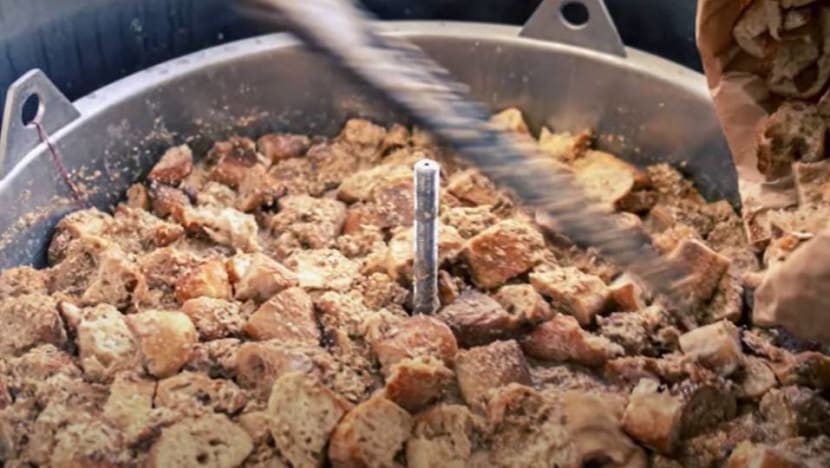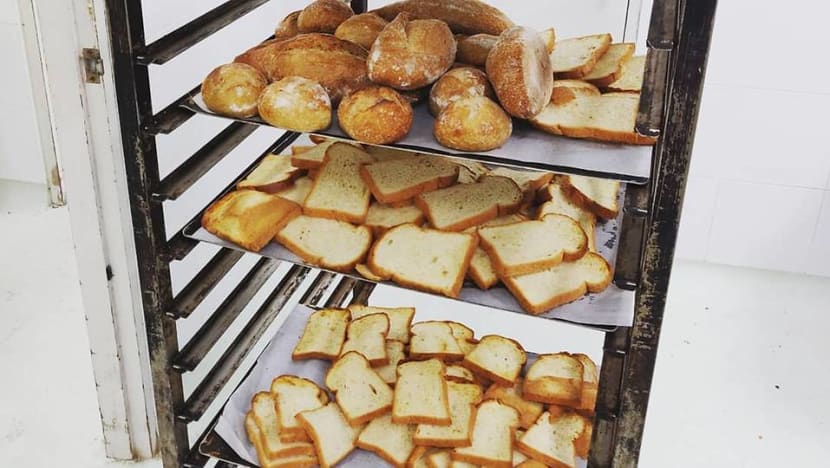No bread left behind: One entrepreneur fights food waste by turning it into beverages
Meet a new breed of eco-entrepreneurs fighting food waste by upcycling bread into beer. Jonathan Peeris speaks to one young local entrepreneur who is brewing up a solution.

CRUST Group takes items such as surplus bread and turns them in beverages.
SINGAPORE: Many Singaporeans are probably aware that food waste is a problem, but what may surprise many is that not all of it comes from leftovers.
A large chunk of the food waste occurs before it ever reaches the consumer.
This can be food that is rejected due to quality control, or discarded because it is too near the expiry date.
For Travin Singh, this represented a huge waste of potential.
Mr Singh is the founder and CEO of CRUST Group, which started out as a brewing company but has now evolved into a food tech company that looks for solutions revolving around surplus food.
Mr Singh first learnt how to brew beers at home with the help of YouTube.
"I tried a couple of ventures at home, you know, failed quite miserably. All my friends didn’t like it. Even I didn’t like it," he said.
Is your fridge full of spoiling food? Storage tips to avoid wastage and to save money
Much research and experiments later, Mr Singh's confidence grew.
CRUST later tied up with Tiong Bahru Bakery, taking their surplus baguettes and turning them into beer. The result - Beerguette.
"They were actually the first B2B company that we did a beer for," said Mr Singh.
CRUST's beers are priced between S$6 and $8.50 a bottle, which is comparable to other local craft beers.
But bread is not the only by-product CRUST uses.
The company has also used rice, tea, coffee, fruits and vegetables, and have also expanded into the Japanese market with a beer made with surplus rice and bread.
In addition to alcoholic drinks under the CRUST brand, Mr Singh also sells non-alcoholic beverages under the CROP label.
‘We are constantly doing R&D on different kinds of wastage just to see what we can convert it into," said Mr Singh.
We want to expand our portfolio into the food side and eventually packaging. We want to do a lot more but one step at a time ... We are quite adamant about proving that there are better ways to do things," he added.

Commentary: Sustainability cannot just be taught in geography lessons
CRUST keeps costs down by doing away with a physical store, and tapping existing breweries to brew their beverages.
For back-end research and technical facilities, they collaborated with the Bright Science Hub facility, which was set up by Dutch health and nutrition company DSM.
Mr Anand Sundaresan, vice president, human nutrition and health at DSM, said: “If you think of startups, there’s a lot of effort that also needs to go in in terms of collaborating with them, whether it’s prototype development, idea generation, proof-of-concepts scaleup, testing, regulatory support, and commercialisation. The innovation hub can play a role in helping to incubate as well as to develop a wide host of technologies working with startups and with the small- and medium-sized enterprises.”
DSM said startups like CRUST are key to tackling the world’s food waste problem.
“Food waste is an unseen and hidden problem because we really don’t realise the amount of food which gets wasted and thrown in landfills. And that has a big social economic impact – not just in terms of greenhouses gases that go into production and distribution. Then when the food waste gets put into a landfill, that leads to the creation of methane which is 21 times more potent in terms of greenhouse emissions than carbon dioxide.”
Why our food supply chain is flawed, and these champions’ efforts to stop the waste
Stakeholders say that startups play a key role, as Singapore aims for its 30 by 30 goal – the target of producing 30 per cent of its nutritional needs locally by 2030.
Singapore can also position itself as a sustainable technology hub in the Asia Pacific.
With the Asia-Pacific region poised to be one of the main drivers of world growth, billions of people have a stake in making that growth sustainable.
As for green tech entrepreneurs like Mr Singh, he is hoping that his brewing solutions can help to reduce global food waste by 1 per cent by 2030.












